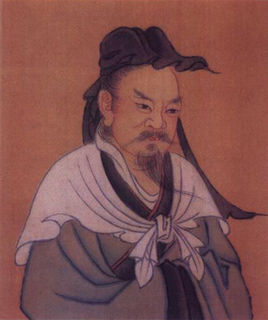(单词翻译:单击)
Dong Zhongshu (179 B. C.~104 B. C.) was a Confucian scholar instrumental in establishing Confucianism in 136 as the state cult of China and as the basis of official political philosophy-a position it was to hold for 2 000 years.
董仲舒(约公元前179年~公元前104年)生于广川,儒家学者,他促使儒家学说成为中国国家思想和官方政治哲学的基础(公元前136年),从此儒家学说统治了中国两千年。
As a philosopher, Dong merged the Confucianist and Yin-Yang schools of thought.
作为哲学家,董仲舒将“阴阳”学说与惴家学说结合在一起。

As a Chief Minister to the emperor Wu of the Han Dynasty, Dong was chiefly responsible for the dismissal of all non-Confucian scholars from government. He established Confucianism as the empire's unifying ideology (136 B. C.) and set up an imperial college, instrumental in the later establishment of the Chinese civil service.
作为汉武帝的主要大臣,董仲舒将所有不是儒生的学者赶出政府,使得汉武帝“罢黔百家,独尊儒术”(公元前136年)并目建立太学,对后来科举制度的建立也有影响。
As a philosopher, Dong made the theory of the interaction between heaven and man his central theme.
作为哲学家,“天人合一”是董仲舒的主要思想。
The emperor is heaven's ambassador on earth, and natural catastrophes such as floods and droughts are Heaven's way of warning the emperor to examine his personal conduct and correct his mistakes.
统治者是上天的使者,旱涝等自然灾害是上天警告统治者要检查个人行为、纠正所犯错误的手段。
Yang (light, positive, male) and yin(dark, negative, female) are the two fundamental forces of the universe and as such should be kept in harmony.
阴阳是宇宙的两股基本力量,因而要保持平衡。
The ruler has the duty to preserve that harmony. He must prevent disturbances by caring for and educating his people.
统治者有责任保持阴阳的平衡,必须通过关爱、教育子民来避免动乱的发生。
He may reform institutions when necessary but may never alter or destroy the basic moral principles of heaven.
统治者可以在必要的时候进行制度改革,但是决不能改变或破坏上天的基本道德原则。
In Dong's system the ruler has the central position-undoubtedly one of the major reasons that Confucianism was accepted by Emperor Wu.
在董仲舒的哲学体系里,统治者居于中心地位。无疑,这是儒家学说被汉武帝接受的主要原因之一。
Confucian scholars, however, are given an equal if less obvious power.
然而,儒家学者也被赋予同样的权利,他们的权利不像统治者的权利那么明显。
It is they who interpret the portents and thus exercise a check on the policies of the ruler.
正是儒家学者解释了征兆,从而检查了统治者的政策。
Dong's "Luxuriant Dew of the Spring and Autumn Annals" is one of the most important philosophical works of the Han period.
董仲舒的《春秋繁露》是汉代最重要的哲学著作之一。
In it, Dong interpreted the Confucian Classic “Spring and Autumn Annals", a chronicle of the events in Confucius' native state of Lu between 722 B. C. and 481 B. C., supposedly edited by Confucius.
在这本书中,董仲舒解释了儒家经典《春秋》。《春秋》是公元前722年至公元前481年间孔子祖国鲁国的编年史,据推测是由孔子编辑的。
Dong felt that Confucius not only recorded events in such a way as to exercise judgment upon them but that he also laid down the rules to be used in governing future dynasties.
董仲舒认为: 孔子在记录事件的同时不但做了判断,而且为后世朝代治理国家定下了原则。
According to Dong, Confucius understood the relationship between man and nature and therefore the way to interpret portents and omens.
根据董仲舒的看法,孔子深谙人与自然之间的关系,因而也知道如何解释征兆。


